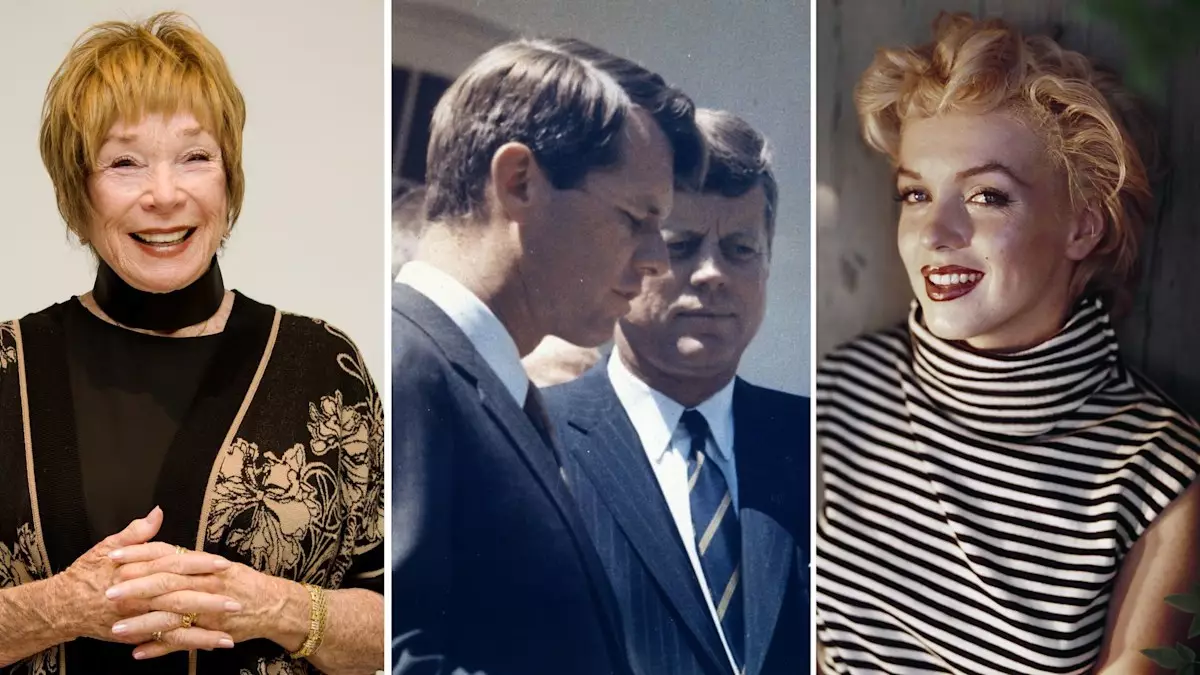The intricate tapestry of American history is often marred by the personal lives of its prominent figures, blending politics with scandal. Recently, actress Shirley MacLaine stirred the pot by unveiling a lesser-known aspect of the affair between President John F. Kennedy and iconic actress Marilyn Monroe. In her latest coffee table book, *The Wall of Life: Pictures and Stories from this Marvelous Lifetime*, MacLaine provides new insights that challenge the comfortable narratives surrounding these historic figures.
MacLaine claims to have witnessed a telling encounter involving not just JFK but also his brother Bobby Kennedy, further complicating the already scandalous affair with Monroe. This revelation opens the door to speculation about the true nature of the siblings’ relationships with each other and with the famous actress, leaving historians and enthusiasts alike eager to reassess the implications of their intertwined lives.
One of the most notable instances highlighting Monroe’s relationship with JFK occurred during the President’s 45th birthday celebration at Madison Square Garden in 1962. While everyone remembers Monroe’s sultry rendition of “Happy Birthday”, MacLaine’s account adds a different flavor to the event. She reminisces about shared performances, hinting at the stark contrast between the glamour of the stage and the private dramas unfolding behind the scenes.
Through her detailed narrative, MacLaine asserts that moments like these were more than just opulent parties; they were breeding grounds for personal intrigue and hidden affairs. The intimate settings serve as a backdrop for political machinations, and her memories suggest that the atmosphere was charged with more than just the thrill of celebrity.
The night of the birthday celebration culminated in a private gathering at the home of Democratic Party finance chairman Arthur Krim. It was here that MacLaine claims to have seen John exiting a bedroom that Marilyn occupied, immediately followed by Bobby’s unexpected entrance. This startling revelation begs the question: What was happening behind closed doors, and how did these interactions shape the personal and political landscapes of their time?
The aftermath of this memorable evening holds even greater significance. Marilyn Monroe died tragically just months later, and reports suggest that Jackie Kennedy issued an ultimatum to her husband following that infamous birthday performance. This incident not only marked key turning points in the relationships involved but also serves as a case study of how personal decisions echoed within larger political narratives.
While Shirley MacLaine is celebrated for her illustrious career spanning decades, her recent memoir transcends mere celebrity storytelling. It offers a fascinating glimpse into her relationships and experiences with some of Hollywood’s most iconic figures, including her brother, Warren Beatty. Unlike her previous works, which emphasize her spiritual journey, this book delves into the intricate personal dynamics that shaped both her life and the lives of others around her.
Interestingly, MacLaine’s candid revelations extend beyond her encounters with the Kennedys. She sheds light on other Hollywood legends, confessing a past “proposition” to Morgan Freeman and expressing why certain co-stars, like Jack Lemmon, held a unique place in her heart. These personal anecdotes juxtapose the weight of historical events with the light-hearted nature of shared experiences among artists.
As we reflect on MacLaine’s admissions, we are reminded that the lives of public figures are often fraught with complexity. The intertwining fates of Marilyn Monroe and the Kennedy brothers are emblematic of how personal choices can shape historical narratives. As new stories and revelations emerge, we find ourselves revisiting the past, reshaping our understanding of iconic figures.
MacLaine’s revelations serve as a catalyst, encouraging us to consider the intricate web of relationships that define American culture and politics. They serve not only as entertainment but as a stark reminder of the human stories behind the headlines—a blend of love, scandal, and the relentless pursuit of connection amidst the pressures of fame.
In an age where the past is frequently revisited, Shirley MacLaine’s fresh perspectives challenge us to dig deeper into the hidden complexities that shape historical understanding. Her memoir is not just a glimpse into her life; it is an invitation for us all to reflect on the myriad ways in which personal circumstances influence public personas, ultimately leaving an indelible mark on history.

